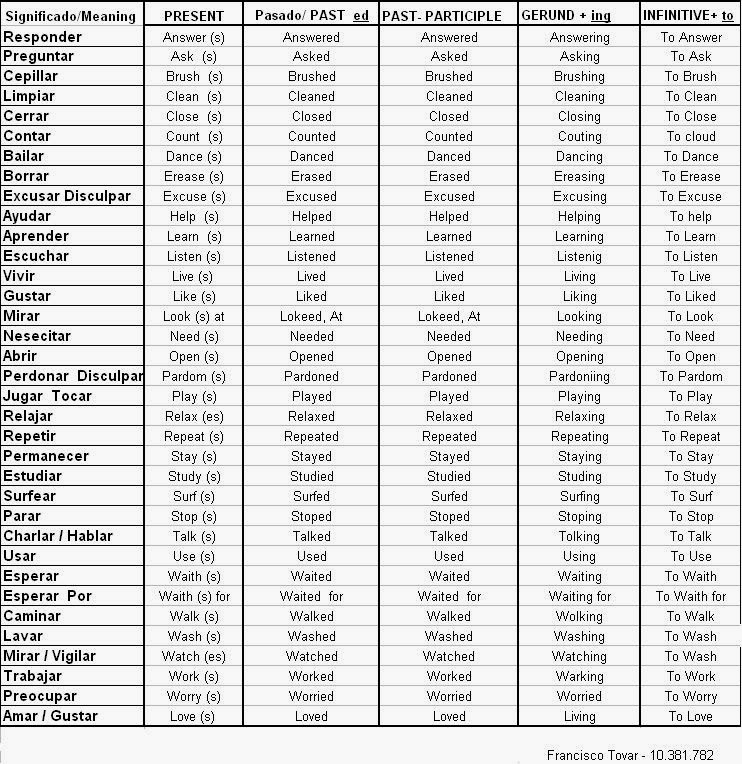L I S T A D O D E V E R B O S
( L I S T O F V E R B S )
( L I S T O F V E R B S )
La mayoría de los verbos ingleses son regulares. Esto significa que podemos confiar en las formas que adoptan porque siguen un patrón predecible. Aquellos verbos que no siguen las reglas básicas se llaman irregulares.
- VERBOS REGULARES (REGULAR VERBS)
http://www.ompersonal.com.ar/omverbs/regularverbs.htm
http://www.curso-ingles.com/verbos-en-ingles/regular.php
AQUI DEJAMOS UN LISTADO DE VERBOS REGULARES
- VERBOS IREGULARES (IRREGULAR VERBS)
http://conjugador.reverso.net/conjugacion-verbos-irregulares-ingles.html
http://www.mansioningles.com/gram53.htm
AQUI DEJAMOS UN LISTADO DE VERBOS IRREGULARES
T I E M P O S V E R B A L E S
VISTO EN GENERAL
PRESENTE
Present
http://www.shertonenglish.com/resources/es/active-voice/present.php
PRESENTE PERFECTO
Present perfect
http://www.shertonenglish.com/resources/es/active-voice/present-perfect.php
PASADO
Past
http://www.shertonenglish.com/resources/es/active-voice/past.php
PASADO PERFECTO
Past Perfect
http://www.shertonenglish.com/resources/es/active-voice/past-perfect.phphttp://www.shertonenglish.com/resources/es/active-voice/past-perfect.php
FUTURO
Future Will
http://www.shertonenglish.com/resources/es/active-voice/future-will.php
FUTURO PERFECTO
Future Perfect
http://www.shertonenglish.com/resources/es/active-voice/future-perfect.phphttp://www.shertonenglish.com/resources/es/active-voice/future-perfect.php
FUTURO "IR"-
Future Perfect "going to"
http://www.shertonenglish.com/resources/es/active-voice/future-going-to.php
FUTURE EN EL PASADO
Future in the Past
http://www.shertonenglish.com/resources/es/active-voice/future-in-past.phphttp://www.shertonenglish.com/resources/es/active-voice/future-in-past.php
FUTURO PERFECTO EN PASADO
Future Perfect in Past
http://www.shertonenglish.com/resources/es/active-voice/future-perfect-in-past.phphttp://www.shertonenglish.com/resources/es/active-voice/future-perfect-in-past.php
CONDICIONAL
Conditional
http://www.shertonenglish.com/resources/es/active-voice/conditional.php
PERFECTO CONDICIONAL
Conditional Perfect
http://www.shertonenglish.com/resources/es/active-voice/conditional-perfect.phphttp://www.shertonenglish.com/resources/es/active-voice/conditional-perfect.php
MODALES
Modals
http://www.shertonenglish.com/resources/es/active-voice/modals.phphttp://www.shertonenglish.com/resources/es/active-voice/modals.php
MODALES + TENER
Modals + Have
http://www.shertonenglish.com/resources/es/active-voice/modals-have.phphttp://www.shertonenglish.com/resources/es/active-voice/modals-have.php
IMPERACTIVOS
Imperatives
http://www.shertonenglish.com/resources/es/active-voice/imperatives.phphttp://www.shertonenglish.com/resources/es/active-voice/imperatives.php
M O D I S M O S
http://es.wikibooks.org/wiki/Ingl%C3%A9s/Vocabulario/Modismoshttp://es.wikibooks.org/wiki/Ingl%C3%A9s/Vocabulario/Modismos
http://www.netplaces.com/ingles/vamos-al-grano/modismos-ingleses.htmhttp://www.netplaces.com/ingles/vamos-al-grano/modismos-ingleses.htm
P R O N O M B R E S
PRONOMBRE PERSONAL O NOMINATIVO
|
PRONOMBRE CASO OBJETIVO
|
PRONOMBRE ADJETIVO POSESIVO
|
PRONOMBRE POSESIVO
|
PRONOMBRE REFLEXIVO
|
Va al
principio
|
Va al
final
|
Según significado
|
Según significado
|
Según
significado
|
I
(Yo)
|
ME
|
MI
(mi o mis)
|
MINE
(mío)
|
MY SELF
(Yo mismo)
|
YOU
(Tu)
|
YOU
|
YOUR
(tu)
|
YOURS
(tuyo)
|
YOUR SELF
(Tu mismo)
|
HE
(El)
|
HIM
|
HIS
(su)
|
HIS
(suyo de El)
|
HIM SELF
(El mismo)
|
SHE
(Ella)
|
HER
|
HER
(su)
|
HERS
(suyo de Ella)
|
HERSELF
(Ella misma)
|
IT
(Eso)
|
IT
|
IT
(su)
|
ITS
(suyo de eso)
|
IT SELF
(Eso mismo)
|
WE
(Nosotros)
|
US
|
OUR
(nuestro)
|
OURS
(de Nosotros)
|
OUR SELVES
(Nosotros mismos)
|
YOU
(Ustedes)
|
YOU
|
YOUR
(tus)
|
YOURS
(tuyos)
|
YOUR SELVES
(Ustedes mismos)
|
THEY
(Ellos)
|
THEM
|
THEIR
(sus)
|
THEIRS
|
THEMSELVES
(Ellos mismos)
|
1.- PRONOMBRE PERSONAL (NOMINATIVO):
Es conocido también como pronombre nominativo, hace papel del sujeto y se encuentra en la oración solo al principio.
EJEMPLO:
- I play tennys.
2.- PRONOMBRE CASO OBJETIVO:
Posee el mismo significado que el pronombre personal, pero se encuentra al final de la oración.
EJEMPLO:
- I play tennys with her.
- I speak Italian with them.
3.- PRONOMBRE ADJETIVO POSESIVO:
Posee el mismo significado de un adjetivo, y se encuentra en la oración al principio o en el medio.
EJEMPLO:
- I will work in my house with her
- You are my student.
- You are my students
- My son is fat.
4.- PRONOMBRE POSESIVO
Significa la posesión que tiene el sujeto sobre el objeto y se encuentra en la oración solo al final
- The bike is mine
- The car is his.
5.- PRONOMBRE REFLEXIVO
Significa el yo mismo del sujeto y se encuentra en la oración al principio o al final
- My self fix my car.
- I fix my car my self.
V O C A B U L AR I O T É C N I C O P O L I C I A L
http://vocabulariodeingles.blogspot.com/2011/08/vocabulario-policial.html
http://diccionario.reverso.net/ingles-espanol/police
http://www.saberingles.com.ar/lists/police.html
http://diccionario.reverso.net/ingles-espanol/police
http://www.saberingles.com.ar/lists/police.html
VIDEO DE PRONUNCIACIÓN DE VOCABULARIO TECNICO POLICIAL
OTRAS PALABRAS Y ORACIONES DE VOCABULARIO TÉCNICO PÒLICIAL







Este comentario ha sido eliminado por un administrador del blog.
ResponderEliminar